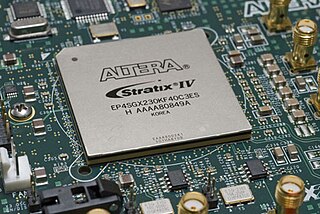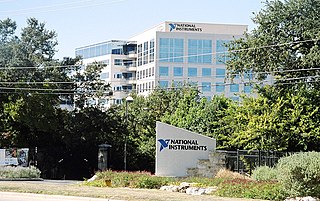Similar products
| | This section needs expansion. You can help by adding to it. (June 2016) |
cRIO (compactRIO) myDAQ
| Manufacturer | National Instruments |
|---|---|
| Available | In production |
| Website | www |
MyRIO is a real-time embedded evaluation board made by National Instruments. It is used to develop applications that utilize its onboard FPGA and microprocessor. It requires LabVIEW. It's geared towards students and basic applications. [1]
(for myRIO-1900)
| | This section needs expansion. You can help by adding to it. (June 2016) |
cRIO (compactRIO) myDAQ

A field-programmable gate array (FPGA) is an integrated circuit designed to be configured by a customer or a designer after manufacturing – hence the term field-programmable. The FPGA configuration is generally specified using a hardware description language (HDL), similar to that used for an application-specific integrated circuit (ASIC). Circuit diagrams were previously used to specify the configuration, but this is increasingly rare due to the advent of electronic design automation tools.

Celeron is Intel's brand name for low-end IA-32 and x86-64 computer microprocessor models targeted at low-cost personal computers.

A front-side bus (FSB) is a computer communication interface (bus) that was often used in Intel-chip-based computers during the 1990s and 2000s. The EV6 bus served the same function for competing AMD CPUs. Both typically carry data between the central processing unit (CPU) and a memory controller hub, known as the northbridge.

Altera Corporation was a manufacturer of programmable logic devices (PLDs) headquartered in San Jose, California. It was founded in 1983 and acquired by Intel in 2015.

Laboratory Virtual Instrument Engineering Workbench (LabVIEW) is a system-design platform and development environment for a visual programming language from National Instruments.

NI, formerly National Instruments Corporation, is an American multinational company with international operation. Headquartered in Austin, Texas, it is a producer of automated test equipment and virtual instrumentation software. Common applications include data acquisition, instrument control and machine vision.

The OMAP family, developed by Texas Instruments, was a series of image/video processors. They are proprietary system on chips (SoCs) for portable and mobile multimedia applications. OMAP devices generally include a general-purpose ARM architecture processor core plus one or more specialized co-processors. Earlier OMAP variants commonly featured a variant of the Texas Instruments TMS320 series digital signal processor.

Universal Software Radio Peripheral (USRP) is a range of software-defined radios designed and sold by Ettus Research and its parent company, National Instruments. Developed by a team led by Matt Ettus, the USRP product family is commonly used by research labs, universities, and hobbyists.
The MicroBlaze is a soft microprocessor core designed for Xilinx field-programmable gate arrays (FPGA). As a soft-core processor, MicroBlaze is implemented entirely in the general-purpose memory and logic fabric of Xilinx FPGAs.
The PowerPC 400 family is a line of 32-bit embedded RISC processor cores based on the PowerPC or Power ISA instruction set architectures. The cores are designed to fit inside specialized applications ranging from system-on-a-chip (SoC) microcontrollers, network appliances, application-specific integrated circuits (ASICs) and field-programmable gate arrays (FPGAs) to set-top boxes, storage devices and supercomputers.
The Atari Coldfire Project (ACP) is a volunteer project that has created a modern Atari ST computer clone called the FireBee.

Datacube Inc. (1978–2005) was an image processing company that developed real-time hardware and software products for the industrial, medical, military and scientific markets.
The SGI Origin 2000 is a family of mid-range and high-end server computers developed and manufactured by Silicon Graphics (SGI). They were introduced in 1996 to succeed the SGI Challenge and POWER Challenge. At the time of introduction, these ran the IRIX operating system, originally version 6.4 and later, 6.5. A variant of the Origin 2000 with graphics capability is known as the Onyx2. An entry-level variant based on the same architecture but with a different hardware implementation is known as the Origin 200. The Origin 2000 was succeeded by the Origin 3000 in July 2000, and was discontinued on June 30, 2002.

The BeagleBoard is a low-power open-source single-board computer produced by Texas Instruments in association with Digi-Key and Newark element14. The BeagleBoard was also designed with open source software development in mind, and as a way of demonstrating the Texas Instrument's OMAP3530 system-on-a-chip. The board was developed by a small team of engineers as an educational board that could be used in colleges around the world to teach open source hardware and software capabilities. It is also sold to the public under the Creative Commons share-alike license. The board was designed using Cadence OrCAD for schematics and Cadence Allegro for PCB manufacturing; no simulation software was used.

The ARM Cortex-A9 MPCore is a 32-bit multi-core processor that provides up to 4 cache-coherent cores, each implementing the ARM v7 architecture instruction set. It was introduced in 2007.
CompactRIO is a real-time embedded industrial controller made by National Instruments for industrial control systems. The CompactRIO is a combination of a real-time controller, reconfigurable IO Modules (RIO), FPGA module and an Ethernet expansion chassis.
The IGEPv2 board is a low-power, fanless single-board computer based on the OMAP 3 series of ARM-compatible processors. It is developed and produced by Spanish corporation ISEE and is the second IGEP platform in the series. The IGEPv2 is open hardware, licensed under a Creative Commons Attribution-Non Commercial-ShareAlike 3.0 unported license.

CompactDAQ is a data acquisition platform built by National Instruments that includes a broad set of compatible hardware and software. CompactDAQ integrates hardware for data I/O with LabVIEW software to enable engineers to collect, process and analyse sensor data. CompactDAQ systems are less expensive than equivalent systems within the NI PXI Platform.